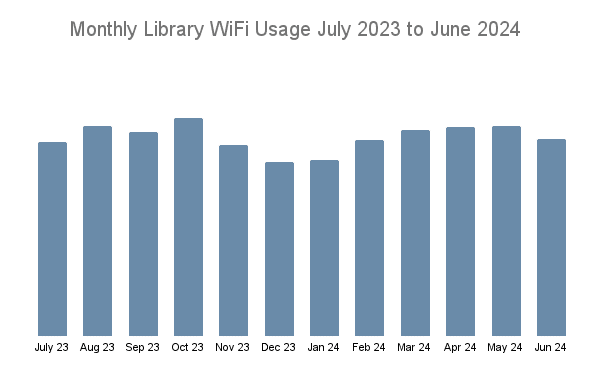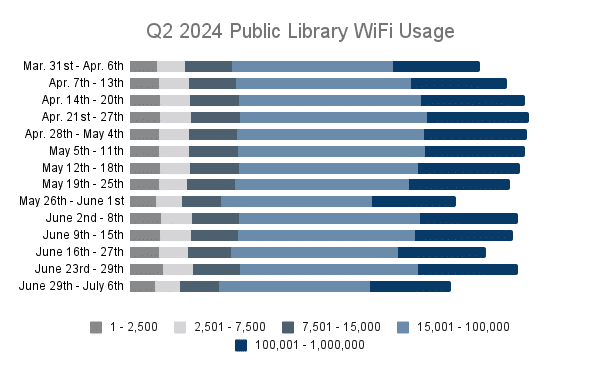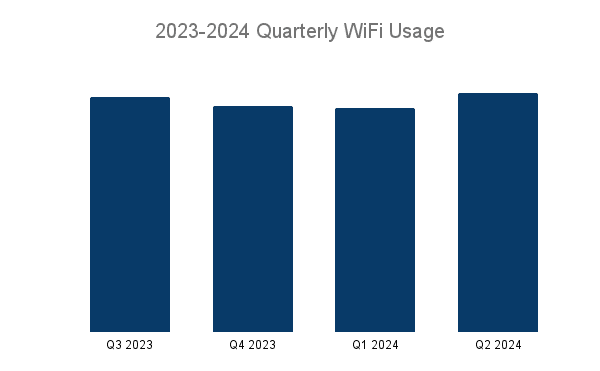Second Quarter 2024 Public Library WiFi Utilization Trends
The second quarter of 2024 highlighted the ongoing importance of public library WiFi in promoting digital equity. There was a slight increase in WiFi utilization from the first to the second quarter, alongside a 7% year-over-year increase compared to the second quarter of 2023. This steady growth underlines the essential role libraries play in providing internet access. This analysis explores the latest data, revealing how libraries adapt to meet community needs through reliable internet and engaging programs.

Spring & Summer 2024 WiFi Utilization and Travel Trends
During the second quarter of 2024, public library WiFi usage experienced steady growth. This increase, although modest, reflects the sustained demand for internet access as the summer season began. Notably, there were typical summer lulls during the weeks of Memorial Day and the Fourth of July, as patrons engaged in holiday activities and travel. Despite these decreases, WiFi usage in other areas remained high, likely due to the variety of in-person programs libraries offered. These programs drew patrons to libraries, helping to offset the impact of seasonal travel trends and ensuring that libraries remained vital access points for information and digital resources.
FCC’s Ruling on Library Hotspot Lending
In June 2024, the FCC began discussing a significant decision to support E-rate funding for WiFi hotspot lending by schools and libraries. This decision, made official in July, enables libraries to apply for E-rate funds to offset the costs of providing hotspots and internet services to patrons for off-premises use. Building on the success of the Emergency Connectivity Fund (ECF) program, which provided critical internet access during the pandemic, the FCC’s new ruling ensures ongoing support for libraries in offering essential connectivity to underserved communities. This initiative reinforces libraries’ roles as digital equity advocates and crucial community anchors (SHLB Coalition) (SHLB Coalition).
Potential Impact of Summer Reading
The start of summer reading programs in the second quarter of 2024 played a crucial role in maintaining high WiFi utilization levels, despite increased travel activities. These programs not only promote literacy but also draw patrons to libraries, providing them with reliable internet access. The engaging nature of these programs ensures that libraries continue to serve as essential community centers for learning and digital engagement. The sustained usage during this period highlights the importance of public libraries in fostering digital literacy and connectivity, particularly during the summer months when other activities might otherwise reduce library attendance.
What Does the Future Hold for Public Library WiFi?
The second quarter of 2024 reaffirmed the crucial role of public libraries in promoting digital equity. With the FCC’s new ruling on hotspot lending, libraries are better equipped to extend connectivity beyond their walls, reaching more patrons in need. As libraries continue to collaborate with state and federal authorities to leverage funding opportunities, they are poised to play an even more significant role in bridging the digital divide. The combination of innovative programs and expanded library WiFi access ensures libraries will remain key players in fostering digital literacy and connectivity for all.

Summary of Q2 Public Library WiFi Trends
- Sustained WiFi Usage: Slight increase from Q1 to Q2, with a 7% year-over-year growth.
- Summer Trends: Typical lulls during Memorial Day and the Fourth of July due to holiday activities and travel.
- Program Impact: High usage maintained by engaging in-person programs and summer reading initiatives.
- FCC Ruling: New E-rate funding supports hotspot lending, enhancing library connectivity for underserved communities.


